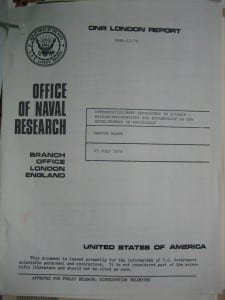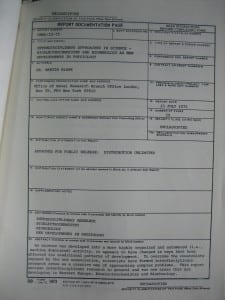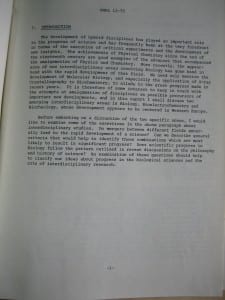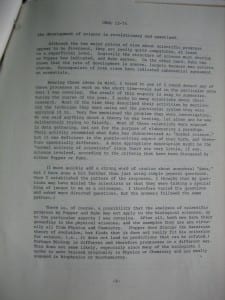the Office of Naval Research and science studies in the 1970s
By Jon Agar, on 16 April 2013
I was in the National Archives at Kew today researching some history of microbiological research and I came across an oddity. It was a paper written by a Martin Blank, issued by the Office of Naval Research’s London branch office in July 1975. It’s title is ‘Interdisciplinary approaches to science – bioelectrochemistry and biorheology as new developments in physiology’. There are several things that odd about it – at least surprising to me.
The paper is ONR-funded science studies – sociology and philosophy of science. The author is a physiologist who wants to know why biology is becoming more ‘interdisciplinary’ and what are the causes of the rise of ‘hybrid disciplines’. He discusses briefly the well known examples of molecular biology and the application of x-ray crystallography to questions of biological structure, but moves on to consider his two more obscure case studies – bioelectrochemistry and biorheology (the science of flow in biological systems).
It starts with an outline of Popper and Kuhn – the usual suspects. But it moves on to cite some authors who have rather dropped out of STS view. For example, there’s a discussion of the geographer RJ Horvath’s notion of the expansion of “machine space” as a master narrative of human history. As machines have exapanded they have encroached on “space that is normally occupied or utilised by people”. Horvath had a paper in Geographical Review in 1974 that I’m tempted to chase up.
There are other odd things, not least the fact that the ONR had a London branch office. Who knew? I hadn’t heard of it before, and I wonder what else it did. I’m guessing that its brief was simply to channel ONR funded research findings to a UK audience. perhaps it funded more sociology and philosophy of science?
Finally, it’s very curious that the paper crops up in the file it’s in (CAB 184 285). It’s being read in the middle of a big discussion about the military withdrawal (or at least relocation) from biological warfare research, and the consequent need to find a role for the Microbiological Research Establishment at Porton Down. In the mix too is the question about how to respond to genetic engineering. Brian Balmer and I are writing a paper on this topic, which is why I came across it. I’ve no idea, yet, if US Cold War-funded science studies is going to be part of the bigger story…
here’s the first few pages of Blank’s ONR paper:
2 Responses to “the Office of Naval Research and science studies in the 1970s”
- 1
-
2
Judith Hadley wrote on 7 July 2013:
There is still an office of ONR in London. Here is the website: http://www.onr.navy.mil/en/Science-Technology/ONR-Global/onr-global-locations/London-ONR-Global.aspx
My father, Dr. Edward I. Salkovitz, was a division chief at the ONR London Branch Office (its name at the time) from 1970-72. Among other duties, he was a liaison to the scientific community.
 Close
Close









Hi Jon,
You are ‘researching some history of microbiological research’… what are you researching? As the largest microbiological society in Europe, with a big archive and an interest in our discipline’s history, we would love to know…
Best wishes, William